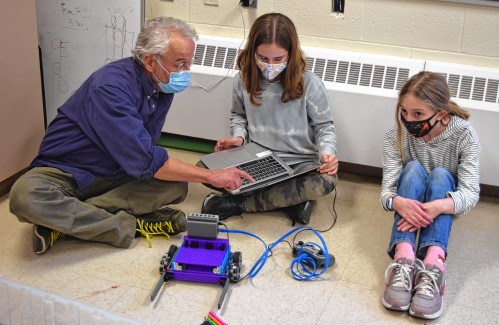The robotics team at Great Brook School in Antrim is about to attend its first competition, right after the school received a grant that will go toward expanding the team.
The team has seen a lot of interest recently, according to Rick Mellin, president of CFM Technologies in Peterborough, who leads the team. The team has 12 members, with more students wanting to join without the resources to support them.
For Mellin, who said he got involved due to his interest in technical education and his desire to help instill STEM (science, technology, engineering and math) skills for middle-schoolers, the future of the team is bright.
“I think next year, my thought is that one of the reasons for the grant is that it will allow us to have a team, for kids that can get started over the summer and get excited for competitions, and one team that’s just a club,” he said. “If they just want to have fun, they can come in for a bit on weeks in between sports, learn about robots, try it out.”
That split into two teams will likely happen for next school year, Mellin said. The $7,000 grant from the state Department of Education will help with this expansion in terms of allowing for additional coaches and more meetings, but it will also be used for attendance fees for robotics competitions.
“Some of the kids love the idea of robots, and would like to try it,” said Cari Gillespie, a seventh-grade teacher whose classroom hosts the robotics team. She, along with Mellin and Catrina Young, administrative assistant at the school, helped jump-start the program in response to student interest.
The team’s first competition, on Jan. 29, is the VEX IQ Challenge, one of many national and international competitions put on by VEX Robotics. Great Brook is the only school from the Monadnock region participating in a field of 19 teams from seven schools. Great Brook has two teams going, consisting of whichever small groups amid the larger team will be ready in time.
This particular challenge is called “Pitching In,” and it has students using their robots — all built with VEX technology — to collect balls and try to sort them into goals on a six- by eight-foot field. Points can be scored by pushing the balls into a low goal, launching them into a higher goal and clearing all balls from their starting position.
The competition will include 60-second matches in different formats — one in which two teams from different schools will work together to score as many points as possible, one in which a single team will control the robot to score as many points as possible and one where students test their programming skills by having the robot attempt the challenge autonomously. Challenges in this particular format include keeping the robots small enough to fit under bars on the field, finding creative ways to collect the balls and the task of programming.
At the middle school level, teamwork is a big element, not just within the team but with another school’s team, and one that Mellin is excited about emphasizing.
“It’s all about collaboration,” he said. “You get paired up with another school, and you have to work together.”
This competition is just the beginning, he added.
“It’s hopefully the first of many,” Mellin said.
The state championships are in February, and as of yet, he is unsure whether the team will go. Many of the usual ways that the state championship operates are not possible due to COVID-19, including the way that teams qualify, which is through their previous performances at meets. Since the upcoming VEX competition is one of the first since the pandemic began, Mellin said he’s not sure what will happen.
Regardless, he said, he’s proud of the progress the team has made.
“We didn’t start until part of the way through COVID, so all of this work has been done in less than nine weeks,” he said. Some other teams have been through multiple different versions of their robots, while this team is still working on prototypes.
The skills required to build and code the robots are impressive, according to Gillespie, and the students have worked very hard.
“When I was a kid, what we were learning in high school, they’re now doing in elementary school,” she said. “And these kids take it up a notch.”
Principal Katherine Foecking said the success of the program has been very exciting for the school.
“Middle school in general, is our belief, a time for kids to explore lots of different opportunities,” she said. “It’s huge, because it’s in the STEM area, and it really gives kids a leg up if they’re going to enter into any science or technology fields.”
For Mellin, it isn’t all about the STEM skills, either.
“I am less concerned with teaching kids specific technical skills and much more interested in providing kids with an environment and the tools that will teach them to think,” he said. “Learn to pose and solve problems, to break down big challenges into manageable pieces … and perhaps most importantly, to develop self-confidence and find joy in learning.”
After all, Mellin said, the ability of the students to use today’s technology won’t matter as much in the future as those skills.
“So much of today’s technology will be very different 10 years from now,” Mellin said. “And those who can think on their feet, learn new things, and adapt to new situations will be, in my humble opinion, in a much better position than those who cannot.”
Credit: Source link





















